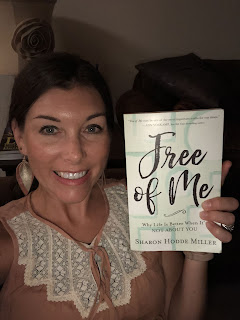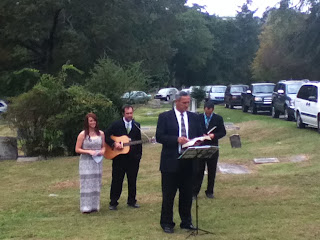Free of Me Book Review
I just finished reading “Free of Me: Why Life is Better When Itʼs NOT ABOUT YOU” by Sharon Hodde Miller. Ann Voskamp said “Free of me May be one of the most important truths for our times.“ I had never heard of this author before but she is a “PhD, a pastorʼs wife, and a mother of two boys.” She has a blog called SheWorships.com. I could totally relate to her book because she and I have a lot in common.
On page 23 she says, “Because I was such a good kid, I received a lot of praise, and soon that became my identity. I needed the praise, which meant the line between doing good for goodnessʼ sake and doing good for appearanceʼs sake became increasingly blurry. After a while, I wasnʼt sure if I was
nice to people because it was Christlike or because I so needed the acclaim.”
I could relate to her in the way she grew up and the encouragement she had from her parents. Being raised that way gave us both confidence in ourselves and the belief that we could do anything for God that we wanted to. I could also relate to her because I was also a “passion” college student meaning I attended some of the passion conferences that Louie Giglio preached at when I was in college. The author and I both pursued God with a passion when we were in school and college and before we got married. I also had big dreams and visions of how I thought God was going to use me in the ministry. I went to Bible college on a Ministry scholarship. After I graduated I got married and my husband was a youth pastor and I served with him and we began having children. I went through a time where I doubted my salvation and I felt like God was unable to use me and I was struggling with my calling. This is the part where I began to learn it was not about me. Just like the author I also wanted to be seen and heard. My husband was wise and he could see that I might have had the wrong motives and I needed to learn some things and go through some experiences before I could speak and share with others. I was young and prideful and I thought I knew so much that could be shared back then which was almost 15 years ago. Like the book says I did feel like God buried my spiritual gifts for a long season while I was having children and I was serving in the nursery. I was serving behind the scenes as my husband planted churches and was pastoring and he was upfront leading and I was in the back never being seen or talked about. But that is where God works deep in our hearts and teaches us that itʼs not about us but itʼs supposed to be about him. He taught me to learn to be content in the background. I learned to find joy being hidden and being at home. I was able to help my husband in the ministry and I was able to serve in a Christian Womenʼs Club ministry as well but all the ways I was serving was not the way I had envisioned I would be serving when I was in college. Sometimes God does have to teach us to deny ourself and to crucify our flesh and to serve in ways that are right in front of us that may not get us famous or even get us a paycheck.
We may have to serve in ways that donʼt get us rave reviews but get us criticized instead.
Those are the times we must remember we are serving an audience of One and all that matters is what Jesus thinks.
Sharon says, “Speaking truth and living courageously means people wonʼt always think you are nice. God and “nice” are two allegiances that often compete.”
“At some point, a self-centered calling conflicts with God- centered callings, because God- centered callings always lead to a cross. God-centered callings involve suffering, sacrifice, and looking like a fool, because this is the path of the Savior we follow. If your calling is about your image, or your reputation, or your comfort and convenience, it will eventually diverge from the path of Christ. At some point, God will ask you to do something that isnʼt about you, or doesnʼt feel good, or requires you to suffer, and you will have to make a choice.”
I love the way she has her book set up. The Mirror Reflex is a powerful analogy in part one. She says two consequences of treating people as a reflection of yourself is:
“First, your self image is shaped by people, possessions, and profession. Second, you make everything about you, even when itʼs not about you.”
The chapters in part two are about “When you make God about you, when you make family about you, when you make your appearance, possessions, friendships, calling, and church about you.”
Part three of the book she talks about how to be ‘free of meʼ through giving God praise, loving others, and finding your purpose and passion.
She pointed out a new perspective and definition of modesty in chapter six.
“Merriam-Webster defines modesty as “the freedom from vanity“. Paul wasnʼt as concerned with womenʼs hemlines as he was their extravagance. He was discouraging them from flaunting their status. Modesty is about much more than covering up. He was urging men and women to pursue a
modesty by which their glory was decreased and Godʼs was increased. The truth is, we can cover every inch of our bodies without addressing immodesty in our hearts. If our basic desire is still for attention and glory, then modesty is not in us. A British writer said “Extreme vanity sometimes hides under the garb of ultra modesty.”
Our culture screams, “Itʼs all about you!” “Me, me!” “Have it your way!” “I got this.” “How to make your ministry the biggest and the best.”
But the Bible says, “He must increase, but I must decrease.” John 3:30
On page 23 she says, “Because I was such a good kid, I received a lot of praise, and soon that became my identity. I needed the praise, which meant the line between doing good for goodnessʼ sake and doing good for appearanceʼs sake became increasingly blurry. After a while, I wasnʼt sure if I was
nice to people because it was Christlike or because I so needed the acclaim.”
I could relate to her in the way she grew up and the encouragement she had from her parents. Being raised that way gave us both confidence in ourselves and the belief that we could do anything for God that we wanted to. I could also relate to her because I was also a “passion” college student meaning I attended some of the passion conferences that Louie Giglio preached at when I was in college. The author and I both pursued God with a passion when we were in school and college and before we got married. I also had big dreams and visions of how I thought God was going to use me in the ministry. I went to Bible college on a Ministry scholarship. After I graduated I got married and my husband was a youth pastor and I served with him and we began having children. I went through a time where I doubted my salvation and I felt like God was unable to use me and I was struggling with my calling. This is the part where I began to learn it was not about me. Just like the author I also wanted to be seen and heard. My husband was wise and he could see that I might have had the wrong motives and I needed to learn some things and go through some experiences before I could speak and share with others. I was young and prideful and I thought I knew so much that could be shared back then which was almost 15 years ago. Like the book says I did feel like God buried my spiritual gifts for a long season while I was having children and I was serving in the nursery. I was serving behind the scenes as my husband planted churches and was pastoring and he was upfront leading and I was in the back never being seen or talked about. But that is where God works deep in our hearts and teaches us that itʼs not about us but itʼs supposed to be about him. He taught me to learn to be content in the background. I learned to find joy being hidden and being at home. I was able to help my husband in the ministry and I was able to serve in a Christian Womenʼs Club ministry as well but all the ways I was serving was not the way I had envisioned I would be serving when I was in college. Sometimes God does have to teach us to deny ourself and to crucify our flesh and to serve in ways that are right in front of us that may not get us famous or even get us a paycheck.
We may have to serve in ways that donʼt get us rave reviews but get us criticized instead.
Those are the times we must remember we are serving an audience of One and all that matters is what Jesus thinks.
Sharon says, “Speaking truth and living courageously means people wonʼt always think you are nice. God and “nice” are two allegiances that often compete.”
“At some point, a self-centered calling conflicts with God- centered callings, because God- centered callings always lead to a cross. God-centered callings involve suffering, sacrifice, and looking like a fool, because this is the path of the Savior we follow. If your calling is about your image, or your reputation, or your comfort and convenience, it will eventually diverge from the path of Christ. At some point, God will ask you to do something that isnʼt about you, or doesnʼt feel good, or requires you to suffer, and you will have to make a choice.”
I love the way she has her book set up. The Mirror Reflex is a powerful analogy in part one. She says two consequences of treating people as a reflection of yourself is:
“First, your self image is shaped by people, possessions, and profession. Second, you make everything about you, even when itʼs not about you.”
The chapters in part two are about “When you make God about you, when you make family about you, when you make your appearance, possessions, friendships, calling, and church about you.”
Part three of the book she talks about how to be ‘free of meʼ through giving God praise, loving others, and finding your purpose and passion.
She pointed out a new perspective and definition of modesty in chapter six.
“Merriam-Webster defines modesty as “the freedom from vanity“. Paul wasnʼt as concerned with womenʼs hemlines as he was their extravagance. He was discouraging them from flaunting their status. Modesty is about much more than covering up. He was urging men and women to pursue a
modesty by which their glory was decreased and Godʼs was increased. The truth is, we can cover every inch of our bodies without addressing immodesty in our hearts. If our basic desire is still for attention and glory, then modesty is not in us. A British writer said “Extreme vanity sometimes hides under the garb of ultra modesty.”
Our culture screams, “Itʼs all about you!” “Me, me!” “Have it your way!” “I got this.” “How to make your ministry the biggest and the best.”
But the Bible says, “He must increase, but I must decrease.” John 3:30


Comments
Post a Comment